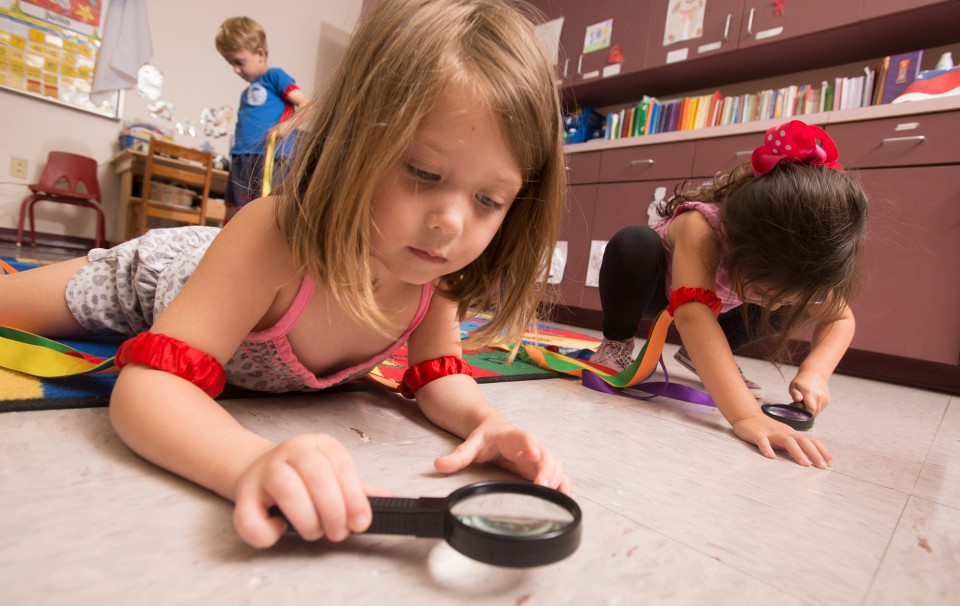How you can use play to help your child learn
- December 5, 2016
- / Shannon Nickinson
- / early-learning

Claire Hedgepeth uses a magnifying glass to investigate along with others in a pre-K class at Myrtle Grove Baptist Church Pre-School Learning Center. Many educators consider pre-K essential to get kids ready to learn. Almost 72 percent of the 4-year-olds in Escambia participate in voluntary pre-K programs. / Photo by Michael Spooneybarger
Before you fill up that holiday gift list for the little people in your life, read this.
A study at Macquaire University in Sydney, Australia, confirms what parents know — that children are always watching us and that they get lots of cues about behavior from what they see adults doing.
The study shows that parents can influence what children want to play with and that they can use that influence to steer young children toward toys that boost literacy and numeracy skills.
Lead researcher Dr Yeshe Colliver, Lecturer at Macquarie University's Institute of Early Childhood, said:
"We know early learning is centred around the child's interests – that is, for children to learn things, they have to be interested in them," Dr Colliver said."Playing is a key way for children to begin learning, but it's hard to see what benefit playing with Spiderman or Barbie can bring. Even more difficult is creating a link between a super hero and, say, mathematics."
The basis of the study comes from the idea that children want to learn the skills they see as important in society, with the theory that children who observed problem-solving literacy and numeracy activities among adults would come to value those skills and want to play and therefore learn about them.
"We tapped into the fact that what children are interested in is a reflection of the world around them, but we didn't know if altering what they are exposed to would shape what they are interested in," Dr Colliver added.
"So as Christmas approaches, educational toys – such as chalkboards, coloured blocks for patterning or tool sets – may be a good option after all, if adults also use similar tools in everyday life.
The Studer Community Institute has worked to focus attention and effort on the critical role that the years from birth to 3 play in the development of a child's brain — and to help parents and the community see the link between that brain development and school readiness.
That's important in our community, where data from the Florida Office of Early Learning indicates that only 66 percent of kindergartners are ready for school. Children who are not ready for kindergarten are more likely to struggle throughout their elementary school years, putting them at risk of not graduating on time with their peers.
What the Macquarie University study shows is that parents, grandparents, aunts and uncles can all help build Pensacola into an "Early Learning City" one holiday or birthday present at a time.
That could truly be a gift that keeps on giving.

 CivicCon launches with a look at good growth in cities
CivicCon launches with a look at good growth in cities
 Building stronger brains one baby, one parent at a time
Building stronger brains one baby, one parent at a time
 SCI debuts commercial on Early Learning City
SCI debuts commercial on Early Learning City
 Entrecon: World class speakers and an opportunity to sharpen skills
Entrecon: World class speakers and an opportunity to sharpen skills
 PYP Quality of Life survey 2017
PYP Quality of Life survey 2017
 EntreCon Pensacola 2016: A look back
EntreCon Pensacola 2016: A look back
 Leadership tip: getting better employee takeaways
Leadership tip: getting better employee takeaways
 Leadership tip: be interested instead of interesting
Leadership tip: be interested instead of interesting
 Leadership tip: delivering difficult messages
Leadership tip: delivering difficult messages
 Brain Bags boost Arc, Early Childhood Court programs
Brain Bags boost Arc, Early Childhood Court programs